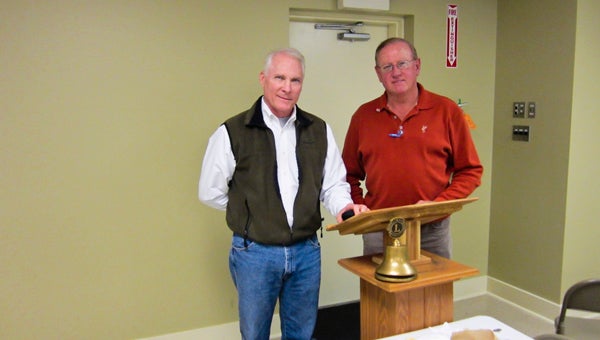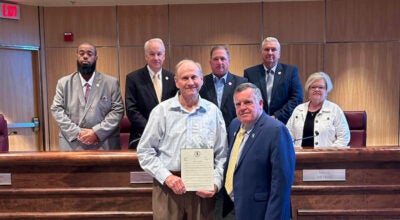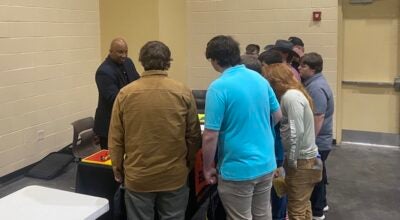Speaker pushes natural resource preservation to club
Published 4:04 pm Monday, May 13, 2013

District Conservationist John Harris of the USDA Natural Resources Conservation Service (left) spoke to the Clanton Evening Lions Club last week. Harris is pictured with club president Frank Daniel.
Keeping clean the water that constitutes Lake Mitchell was one suggestion District Conservationist John Harris made to the Clanton Evening Lions Club last week as he talked about the importance of preserving natural resources.
Harris, who is employed with the United States Department of Agriculture Natural Resources Conservation Service, said people sometimes forget how they treat the soil affects the cleanliness and composition of water sources utilized for hydroelectric power, drinking water and recreational activities in their area.
In Chilton County, the way residents treat their soil impacts the Coosa River and Lake Mitchell.
The Coosa River is the main source of drinking water for Clanton, and Lake Mitchell is home to thousands of people and animals living in and around the water.
“A couple of years ago, the rivers were the interstate highways, and most every county or town has flourished or settled for some resource reason,” Harris said.
Litter, pollution and chemical waste are among the things that can harm soil, water and air quality.
For example, dumping debris or chemicals onto Chilton County’s soil could stunt the growth of its staple peach crops or cause cattle that eat grass daily to become sick.
Without viable fruit and vegetable crops and healthy cattle, farmers in Chilton County and counties similar to it would suffer financially, as would the local economy.
“The detriments may not show up till 5–10 years down the road,” Harris said. “The more people that are made aware of connecting the dots, the better the quality of life, the community and the sustaining of resources. We want to work in harmony with the land.”
According to Harris, the damage in one area can also spread through water or air to areas beyond the county’s borders, affecting even more people and animals that rely on natural resources for food, power and commerce.
“A lot of times, we lose sight of the fact that whatever happens on the ground affects natural resources,” Harris said. “Look beyond your borders and see that what you’re doing may impact things off-site. Become involved. For every action, there’s a reaction.”
Harris said anyone could help preserve natural resources by assessing what they have and how they are maintaining it.
“Do you have a house and lawn?” Harris said. “Do you have 60 acres of timber?”
Harris said reducing or eliminating the use of fertilizer or weed killer in one’s yard and managing woodlands by harvesting timber are simple but effective ways to help improve the condition of surrounding soil.
“Minimize your impact around the streams,” Harris said. “We all hope that we can leave [the environment] better than we found it.”
Harris serves Chilton, Autauga and Elmore counties and will speak to the Evening Lions Club again about natural resource preservation and other topics on Monday, June 3.






